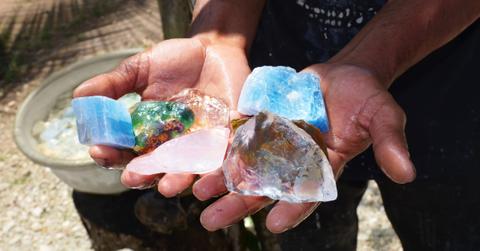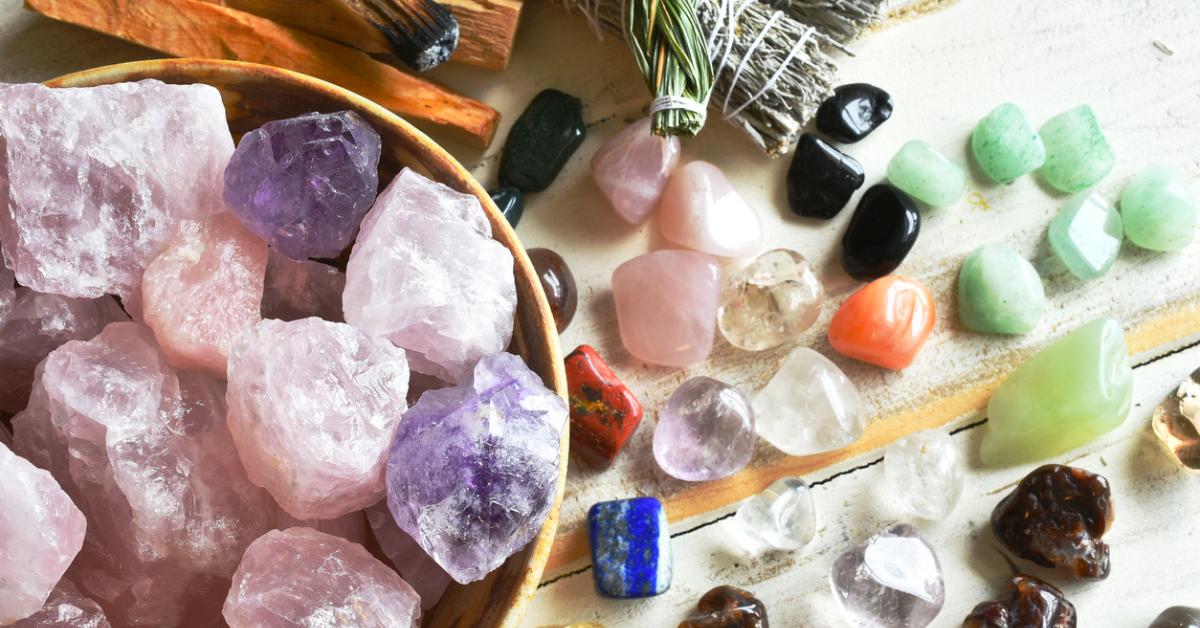Do Ethically Sourced Crystals Exist? Cleansing Rituals Can't Sanitize the Dark Truth
Published Nov. 28 2023, 4:33 p.m. ET

The Gist:
- Loved for their metaphysical "healing" properties, the crystal industry is worth billions.
- Crystal mining is unregulated, and seems to be bad for the environment.
- Crystals are barely traceable and often mined by children.
- Some crystal retailers and jewelry companies prioritize ethical sourcing.
- Self-mining can be a more ethical way to get crystals.
There's an oddly warm feeling that comes with purchasing a palm-sized stone in a tiny satin drawstring bag from a witchy, essential oil-infused shop. Along with your new orange-hued citrine comes a little card with a list of associated properties, including increased confidence, motivation, optimism, and overall clarity.
Respectful skeptics and woo-woo crystal masters alike may own several books on crystal lore and rituals, but we'd bet that you don't know much about your colorful collection's origin story.
The Guardian's 2019 article "Are crystals the new blood diamonds?" put a spotlight on the evils of the crystal industry. Mentioning the Olsen twins, Kim Kardashian, and Gwyneth Paltrow as crystal lovers (we can't help but eye-roll thinking about Goop's lawsuit-causing vaginal crystal eggs), the publication highlighted the economic power of the crystal industry.
Crystals — which the International Gem Society (IGS) defines as "a solid whose atoms are arranged in a 'highly ordered' repeating pattern" — are sadly a non-renewable resource, and the crystal mining industry is dangerous, low-paying, and unregulated, as per The Guardian.
Plus, according to the blog Gittemary, mineral and crystal mining causes soil erosion, sinkhole formation, biodiversity loss, and severe water pollution.
None of this radiates feelings of "wellness," and your outspoken crystal-obsessed pals are starting to seem hypocritical.
All of this begs the question: Is there such a thing as ethically-sourced crystals? Let's mine for answers.

Do ethically sourced crystals exist?
Sadly, there's no crystal version of the (flawed) Kimberley Process — an international trade regime that aims to reduce the flow of conflict diamonds globally.
In 2020, Cosmopolitan published an articled titled "Buying Ethical Crystals Shouldn’t Be This Hard," listing off tragic investigations into crystal mining like it was a bloody grocery list. From heroin use and HIV infection in Kachin miners to Amazon rainforest destruction to 85,000 child miners working in Madagascar, the various reports mentioned were shocking.
A quick Google search of "ethically sourced crystals" leads to a slew of Etsy shops, but many don't back up their claims. Cosmo spoke exclusively with 20 active crystal vendors on Etsy and 14 claimed that their crystals were sourced ethically, "but most didn’t share details about specific mines."
"I'll take your word for it" — in terms of shops, suppliers, and mines — doesn't really work when the planet and human beings are at risk.
With all of this in mind, transparent crystal companies do exist. Crystal and jewelry company Solstice Stones believes "good energy starts with good sourcing." With over 15 years in the industry and knowledge pulled from Columbia Gem House, the Chicago Responsible Jewelry Conference, and the Ethical Gem Fair, Solstice Stones has perfected its ethical sourcing process.
"The importance of traceability, transparency, and a short supply chain is clear, as is supporting positive development in ecological awareness, fair labor practices, and empowerment for women," the company's website reads.
Though we'd like to point out that those off-limit countries and stones weren't specified, Solstice Stones is crystal clear about its Ethical Sourcing Model. The company won't purchase crystals from traditional wholesale companies or from certain countries, and it won't sell certain crystal types; additionally, it will only purchase crystals directly from like-minded small scale mine owners, and crystal dealers who buy from miners on site.
Solstice Stones also offers "Reclaimed" crystals, which were either upcycled or were once considered unsellable byproducts.
Consider taking a trip and mining your own crystals.
While Cosmo listed the Modern Mystic Shop as another ethical crystal retailer to check out, it suggested self-mining as an alternative!
The Crystal Grove Diamond Mine & Campground in St. Johnsville, N.Y., and the Bonanza Opal Mine in Denio, Nev., offer fun crystal-hunting activities. The IGS even suggests visiting Fairy Stone State Park in Virginia for natural cruciform staurolite, aka "fairy stones."
Self-mining allows for crystal lovers to take matters into their own hands, not to mention a sentimental experience.